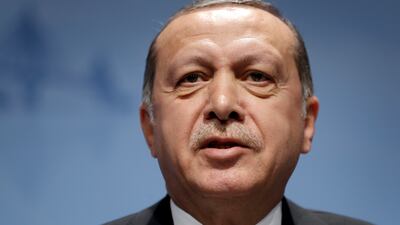As the last US flight left Kabul’s airport on Monday evening, the question of what Afghanistan’s future relations with the international community will look like remained largely unanswered.
But it is a question that diplomats and politicians around the world are rushing to resolve – none more so than those in Turkish President Recep Tayyip Erdogan’s Ankara palace.
Even before the Taliban took Kabul more than two weeks ago, Mr Erdogan had moved to place Turkey at the fore of prospective ties with the militant group.
“The Erdogan government hopes that its attempts to build a relationship with the Taliban will provide Turkey with additional leverage in its relations with the United States, the European Union and Nato,” said Aykan Erdemir, senior director of the Turkey programme at the Washington-based Foundation for the Defence of Democracies.
“Moreover, Ankara sees the developments in Afghanistan as an opportunity to secure economic opportunities in the war-torn country while also enhancing Turkey’s power projection globally.”
Much of the discussion about Turkey’s role in Afghanistan has focused on Kabul’s Hamid Karzai International Airport, a crucial lifeline for a country reeling from more than four decades of war.
Mr Erdogan first suggested a Turkish role in operating and guarding the airport in a June meeting with US President Joe Biden. But the Taliban’s rapid takeover left the plan unworkable when the militants insisted on all Turkish forces withdrawing, something completed at the weekend.
Turkey is now in talks with its ally Qatar, which has strong ties to the Taliban leadership, over running the airport together. Turkey’s defence and foreign ministers spoke with their Qatari counterparts at the weekend.
On a wider front, Mr Erdogan hopes to develop close ties with the Taliban and has spoken in conciliatory tones about the group in recent weeks.
On a return flight from Montenegro on Sunday, he told journalists that Turkey would retain its diplomatic presence.
“Afghanistan must recover quickly. The Afghan people cannot bear such a burden,” he said.
Mr Erdogan also offered Turkish construction and infrastructure know-how while holding out the prospect of a “Libya-like” deal with the Taliban.
Turkey signed a security and military co-operation deal with Libya’s UN-recognised government in late 2019.
Despite its insistence on the removal of Turkish troops, the Taliban have also been making overtures to Ankara.
“The Turkish people and state are our friends. We have many reasons to continue this friendship,” Taliban spokesman Zabihullah Mujahid told Turkey’s state-run news agency on Sunday.
Any arrangement will be bound to result in Ankara recognising the Taliban as Afghanistan’s legitimate government.
However, potential Turkish involvement in the early stages of the post-US period has led to concern about policy direction.
“Currently, even the Taliban describe themselves as an interim administration; there’s no government. The phrase ‘Libya-like deal’ is a hasty statement,” said retired Brig Gen Ali Er.
Turkey seems to be pursuing a role in Afghanistan “no matter what happens,” he said. “I can explain the intent as strengthening Turkey as the go-between with the US and the EU, as well as China and Russia.”
Onur Oymen, a former Turkish diplomat and MP, also raised concerns about the current uncertainty in Afghanistan.
“It is unclear how much support the Taliban’s government will receive from around the world,” he said. “It is unclear where Afghanistan will go yet; there is no government. It is unclear what kind of governance will be formed ... It is incomprehensible to rush into the middle of all this uncertainty to say ‘We can make a deal'.”
Others suggested that Mr Erdogan’s eagerness to embrace the Taliban echoed his previous foreign ventures.
Gonul Tol, director of the Middle East Institute’s Centre for Turkish Studies, said Mr Erdogan “sees opportunity where others see trouble,” citing Turkey’s hosting of 3.7 million Syrian refugees that he has used as a “trump card” in relations with Europe.
“From Syria and Libya to the eastern Mediterranean, Turkey has been engaged in a high-stakes gambit in search of much-needed leverage,” she said. “Afghanistan is next in line.”
Dr Erdemir, meanwhile, said Mr Erdogan was banking on his close ties to Pakistan and Qatar to reach deals with the Taliban.
There has been a recent sharp rise in anti-migrant feelings – Turkey is home to an estimated 300,000 Afghans – and Karol Wasilewski, head of the Middle East and Africa programme at the Polish Institute of International Affairs, said this could create “bigger complications” for Mr Erdogan.
“Since Turkey’s presence in Afghanistan does not seem to be popular among the electorate, there may be additional pressure on the decision makers to withdraw from any deals with the Taliban,” he said.
But Dr Erdemir issued a warning that, in addition to security risks for Turkish contractors in Afghanistan, “such a close working relationship with the Taliban government could also further tarnish the Erdogan government’s image”.
Any deal between Ankara and the Taliban is “fraught with risks and it is unclear whether it will deliver the intended results, but Erdogan is determined to try”, Dr Tol said.


















